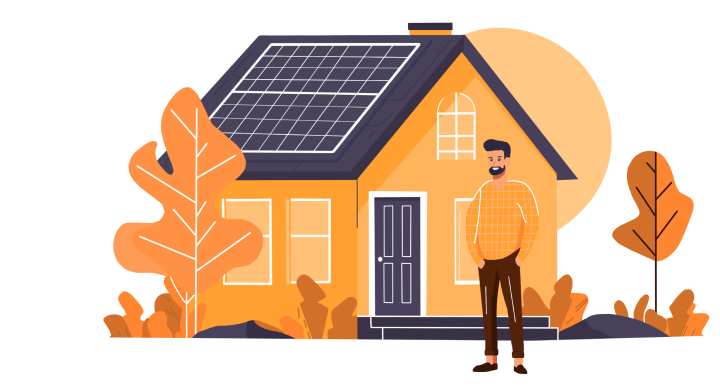Finding a reliable solar PV installer, also known as a solar photovoltaic installer, is a crucial step toward making your home more energy-efficient.
Having to choose among your many options for solar installers can seem overwhelming, but it's achievable when you know what to look for and have a resource like Solar Energy Host's platform. Here's how to choose a solar power installer that's right for the job.
Step #1: Get matched with certified solar PV installers through Solar Energy Host.
Solar Energy Host delivers competitive quotes straight to you from certified installers in your area. This way, you can make your search easier through our curated list of contractors that are not only certified but also accessible.
Use Solar Energy Host to connect with NABCEP-certified installers.
North American Board of Certified Energy Practitioners (NABCEP) certification sets the industry standard for solar installers, ensuring they have undergone rigorous training and testing. By using Solar Energy Host, you can quickly narrow down your choices to professionals who meet these high standards and connect with them.
This guarantees that your residential solar installation project will be handled by a certified solar panel installer who is knowledgeable and reliable.
Choose installers experienced in local regulations and climate.
Solar Energy Host also helps you narrow down your options to solar installation companies in your area. This way, you can connect with installers familiar with your area's specific regulations and climate.
A local solar PV installer will have an intimate understanding of your region's building codes, permitting requirements and weather conditions. This knowledge is crucial for designing solar power systems optimized for your home and compliant with local laws.
Experienced in dealing with local climate, these professionals can recommend the best photovoltaic panels and other solar equipment as well as installation configurations that may maximize solar energy production for your home.
Step #2: Evaluate installer reputation and customer satisfaction.
Check customer reviews and testimonials.
Verifying customer feedback is crucial to assessing the reputation of a solar PV installer.
Look for verified reviews and testimonials that detail the solar installation process, professionalism and post-installation support. Honest feedback from previous customers can give you a realistic view of what to expect, highlighting both the strengths and potential pitfalls of each installer.
Choose installers with a proven track record.
Opt for a professional solar installer that has consistently delivered high-quality installations. Look for portfolios or case studies showcasing their previous work, which you can request directly from them or find on their website. Selecting an installer with a history of success minimizes the risk of problems.
Ensure strong warranties on both equipment and labor.
Make sure the installer provides robust warranties that cover both equipment and labor. An extensive equipment warranty ensures that the solar panels and inverters will function as expected for many years. Equally important, a labor warranty guarantees that any solar panel installation issues will be addressed by the installer without an extra cost to you.
Step #3: Verify that your potential installers handle all permits and regulatory requirements.
Work with a solar PV installer who can handle the full permitting process.
Navigating local building codes and regulations can be complex and time-consuming. Choosing an installer who manages all the required permits ensures your system complies with all local legal requirements. This not only streamlines the process but also removes the burden from you to ensure that every necessary permit is obtained.
Step #4: Finalize your decision and move forward with installation.
Carefully review the contract before signing.
Finally getting to incorporate solar energy solutions into your home can be exciting. However, don't just sign a contract the second you choose a solar PV installer. Review the solar power installation contract thoroughly first to ensure all details about costs, warranties and timelines are clear.
Contracts can be dense, but it's crucial to read every section. Make sure that all verbal agreements you've discussed with the installer are included in writing as unclear details can lead to misunderstandings later. Look for any hidden fees or vague terms that could impact you in the long run.
Schedule a site assessment to finalize the system design.
Once you've selected your installer, schedule a site assessment where the installer will evaluate your roof, shading and energy needs to finalize the system design.
A site assessment is a critical step to customize your solar PV system to your home's unique requirements. During this visit, the installer checks your roof's condition, orientation and any potential shading issues from surrounding trees or buildings. This evaluation ensures that they install solar panels that maximize energy production and are tailored to your specific energy requirements.
Frequently Asked Questions (FAQ)
What should I look for when selecting a solar PV installer?
When selecting a solar PV installer, start by looking for reputable certifications. A key certification to look for is NABCEP, which ensures the installer has undergone rigorous training and meets industry standards.
Additionally, ensure the installer has experience with projects similar to yours, which can provide confidence in their ability to handle your specific needs. It's also wise to read customer reviews to gauge reliability and ask about warranties on both equipment and labor to protect your investment.
Comparing multiple quotes from various installers is also important as this can help ensure you get a fair price for the services offered.
How does a solar PV system work?
A solar photovoltaic installation converts sunlight into electricity using solar panels.
These panels are made up of semiconductor cells, which are sensitive to sunlight. When sunlight hits the cells, it excites electrons, generating direct current electricity. An inverter within the system converts this into an alternating current that powers your home.
What are the different financing options for solar PV systems?
Financing options for these systems include:
- Solar loans. These allow you to own the system while paying off the loan over time, making it similar to a mortgage but for solar panels.
- Leases. With this option, you pay a fixed monthly fee to "rent" the solar panel system. While you don't own the system, you still benefit from the energy it generates without the upfront costs.
- Power Purchase Agreements. This lets you pay only for the electricity the system produces, typically at a lower rate than your utility.
Your key to solar savings and cleaner power
At Solar Energy Host, we're all about helping homeowners do their part in building a brighter, cleaner future by connecting them to top installers in their communities. Take the first step towards having a more sustainable home and find out the cost of solar power installation in your area now!














